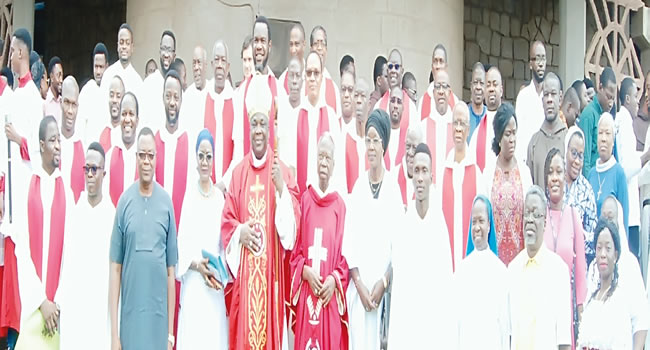
The Dominican University, Ibadan, earlier in the week formally resumed for a new academic session. But before their inaugural thanksgiving Mass and an orientation programme for its new students, the staff members of the university had a brainstorming session on the new prospectus and grading system approved for use by the National Universities Commission (NUC). The CCMAS approved by the NUC has come into effect and the various universities are working to find their feet in the new field. Dominican University, Ibadan saw the need to be properly equipped in the new system and therefore held a workshop on it.
The university, as its new session kicks in, has organised an orientation for its senior academic and administrative staff members to acquaint them with the relevant tools as the varsity begins the implementation of Core Curriculum and Minimum Academic Standards (CCMAS) for its Year One students. The commencement of the CCMAS as the new basic benchmark for the Nigerian University System signals the gradual phasing out of the Benchmark Minimum Academic Standard (BMAS), which had been the standard measurement over the years. The implementation of CCMAS follows the completion of activities on a report on the new scheme by stakeholders under the aegis of the NUC.

Nigerian universities operated under what used to be called the Minimum Academic Standards (MAS) which the NUC said started in 1989. According to NUC, a review of the MAS curriculum by 2004 “led to the evolution of the Benchmark Minimum Academic Standards (BMAS).”
The CCMAS, as the grandchild of the earlier systems would need to be properly situated for a smooth take-off, a thought which gave rise to the staff orientation.
After the welcome formalities and the back-patting conviviality among the resuming staff, the Vice Chancellor of Dominican University, Professor Jacinta Opara, formally kicked off the programme with a lecture entitled “Effective Leadership and Community Service for Sustainable University System.” Prof Opara charged the university’s senior academic and administrative staff to always reflect on this and make themselves useful wherever they found themselves.
She said it was important to gather, embark on self-reorientation and reflect on ways to improve in their duties. “Let us not just enhance the reputation of our university but we must let the ripples effectively impact our society; and leadership and community service, in this context are two sides of a coin,” Prof Opara stated.
The Dean, Faculty of Humanities and Social Sciences of the university, Professor Dokun Oyeshola, began the technical aspect of the day’s programme. Prof Oyeshola told the gathering that BMAS was used for 13 academic disciplines, and was in operation in Nigeria until complaints arose about university products. He said: “There were complaints that graduates were either unemployable or cannot fit into the system.”
Following the complaints about the graduates, the NUC, with all relevant stakeholders including the Nigerian Economic Summit Group (NESG) met and, in response, they came up with the CCMAS. “CCMAS was to reflect the 21st Century realities”, Oyeshola explained and added that it was “a product of sustained stakeholders’ interactions.”
He said the CCMAS recommended that there would be 70 percent minimum core course requirements for graduates while Nigerian universities will be expected to provide remaining 30 percent. It also recommends a reduction in GNS courses from 36 credit units to 12 credit units of six courses as follows: Communication in English, Nigerian People and Culture, Philosophy, Logic and Human Existence’ Entrepreneurship and Innovation, Venture Creation’ and Peace and Conflict Resolution.”
The Dean treated many other technical issues in his paper, and also highlighted “20 golden rules for writing objective questions for the students.” The fine details of his lecture also included the dos and don’ts for staff members with regards to their relationships with the students and warned that “academic staff should prepare well and be masters of their subjects so that students will not ridicule them.
He also highlighted some of the concerns in the CCMAS. One of them was that there were “too many courses in a semester and by so doing implicating usage of space and facilities.” He said “there are too many courses that do not allow for the provision to retake or carry-over courses.” In addition, he observed that because of the enormity of courses, “social life of staff and students are compromised because there is no breathing space for them.”
According to him, the challenges had been brought to the knowledge of the NUC.
The institution’s Director of Academic Planning, Rev Fr Bonaventure Agbali OP, in an intervention, said the university had all it needed to begin the implementation of CCMAS and said “it would begin with the new intakes.” He assured that while the concerns linger and are being looked into, “we will start and make adjustments along the way while awaiting the decision of the NUC.”
READ ALSO: Police confirm Oloba Salo hospitalised after gun attack in Lagos







